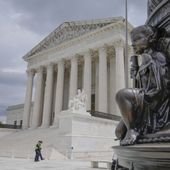CARACAS, Venezuela — A dozen people gather inside a rudimentary, two-story brick house in Catia, the most dangerous of all the slums that ring the Venezuelan capital, Caracas.
They talk excitedly about plans to repair crumbling walls, clear sewage and help local enterprises. It is the business of civic leaders everywhere — yet this gathering is also the vanguard of leftist President Hugo Chavez’s 21st-century “socialist revolution.”
By the time they have been trained and armed, they will also be ready to defend Venezuela against outside interference, including the U.S. invasion that Mr. Chavez says he expects.
“El Comandante told us to create communal groups and to tackle problems ourselves,” said Lenny Guerrero, 35, to nods of assent from others in the room. “Some government officials came here to help us create the groups. Power will now rest with the people.”
On Mr. Chavez’s order, 17,000 communal councils have been set up across the country, and an estimated $2 billion earmarked to fund them.
As the official slogan, “Build power from below,” proclaims, their stated purpose is to promote grass-roots democracy and hand power directly to the people — in particular the urban poor who make up the bulk of his most fervent supporters.
But as well as grappling with the grim conditions in slums such as Catia, members of these voluntary groups will constitute a nationwide militia, schooled in Cuban-style tactics for both guerrilla warfare and counterinsurgency.
Gen. Alberto Mueller, an adviser to Mr. Chavez, said: “Some communal groups have already received military training. They’ll train in their own neighborhoods and will be equipped with any arms — guns, grenades, knifes — the community can provide. We have a right to defend ourselves.”
The move has caused alarm among Mr. Chavez’s critics, who say the groups will be used to repress internal dissent.
They point out that, unlike Venezuela’s military reservists, the communal councils come under Mr. Chavez’s direct control, including the appointments of their oversight committees and allocation of funding.
They are being created in tandem with plans to expand Venezuela’s military reserve fivefold, from about 200,000 people to 1 million — a move Mr. Chavez has introduced in the belief that his sworn foe, the United States, is planning some kind of military intervention.
Tensions with Washington and the West are likely to escalate further next month, when the Chavez government plans to begin taking control of the main European and American-owned oil fields in Venezuela — a move ordered by presidential decree in February.
The communal councils project is being overseen by David Velasquez, a communist who is the president’s new “minister of the popular power for participation and social development.”
Although the favored blueprint for the scheme is the Paris Commune of 1871, under which socialism briefly reigned in the French capital, critics say it is more reminiscent of “mini-Soviets,” which will be used to monopolize Venezuelan local politics.
Emilio Grateron, an opposition councilor from the rich Chacao area, contended that communal councils which did not toe the Chavez line were usually denied permission to set up.
“When we went to the ministry to set them up, they asked us our political affiliation. When they saw we’re not Chavistas, they didn’t say no but flooded us with requests until you feel like giving up,” he said.



Please read our comment policy before commenting.